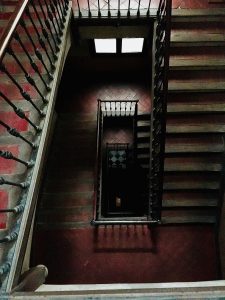
Photo by Peter Scholten on Unsplash
Our ONL journey has started with the FISh document, which inspired me thinking of the experience as a sea journey – which actually is my favourite environment. So, let me continue with my cruise excursion which has suddenly grown into a two-months long voyage across the world. If we can just briefly embrace the picture above – on the left is a smaller boat – aka ‘tug boat’ (i.e. PBL group) with a small but selected crew, and on the right is a huge cargo ship (with the outstanding ONL crew and goodies). You are surely getting the idea, what it takes.
We have been gradually unpacking the scenarios, resources, participating in webinars, PBL groups, and with our joint effort we have been getting the huge ship out of the departure harbour into the new destination, unloading the containers as we go. By working together both in our PBL groups, and communicating, interacting and exchanging ideas with our lecturers and facilitators (thank you Filip and Suzanna), meeting other crew members, we are finally getting there to the other end. What awaits us there, on the other side?

Photo by Lee Lawson on Unsplash
Being part of a learning community is no easy task, but it is hugely rewarding. Especially, in the context of PBL group Take V, coming from different academic and cultural backgrounds, it is both somewhat challenging and hugely gratifying. By addressing the challenges, we create opportunities.

Photo by Estela Romero on Unsplash
Are these stairs going up or down? I think Take Ver’s could discuss that fiercely for a very long time. This is how we would approach our scenarios. You know the Six Thinking Hats of Eduard de Bono https://www.debonogroup.com/services/core-programs/six-thinking-hats/ , we have all of them and we even exchange them sometimes. The point I want to make here is that some key aspects regarding the topics we discuss may be obvious, clear-cut to one person, and completely vague to another. This can be a burden, but it is also a great opportunity! You learn about a different approach, you acquire a different skill, you try out a new collaboration tool, you get a lot of great research references from another academic field that you would hardly come across.
For Topic 3, we truly collaborated on the Mural, both synchronously and asynchronously. What I like about our approach is that we start with connecting the scenario to our personal experiences, then present a specific example from our professional practice to others and get into a discussion, with a specific purpose – to extract key points worth sharing with the big ship.
As Wlodkowski (2004) points out, for adults to strive in collaboration and learning, respect, communication and sharing resources are needed in addition to the appreciation of cultural diversity. Culturally responsive teaching (Wlodkowski and Ginsberg 1995) creates the environment for inclusion and equity by enabling learners to engage in activities and deal with the topics they value and find relevant to their personal experiences, and connect them to the others. This approach has been implemented in our PBL group, which I have found greatly motivating.
Let me finish with a thought I have recently learnt from Prof. Darla K. Deardorff (https://sites.duke.edu/darladeardorff/publications/), one of the well-known specialists in intercutural communication, in her keynote speech – it is that we all belong to a ‘shared humanity’ no matter where we come from. The term has derived from the South African Zulu language saying ‘Ubuntu’ which most simply translates into ‘I am because you/we are’ referring to the interconnectedness of all humanity. Such a challenge in today’s world, and a chance, don’t you agree?
References:
Wlodkowski, R. J. (2004). Creating Motivating Learning Environments. In M. W. Galbraith (Ed.), Adult Learning Methods: A guide for Effective Instruction (3rd ed., pp. 141–164). Krieger Publishing Company.
Wlodkowski, R.J. and M.B. Ginsberg (1995). Diversity and Motivation: Culturally Responsive Teaching. San Francisco: Jossey-Bass.